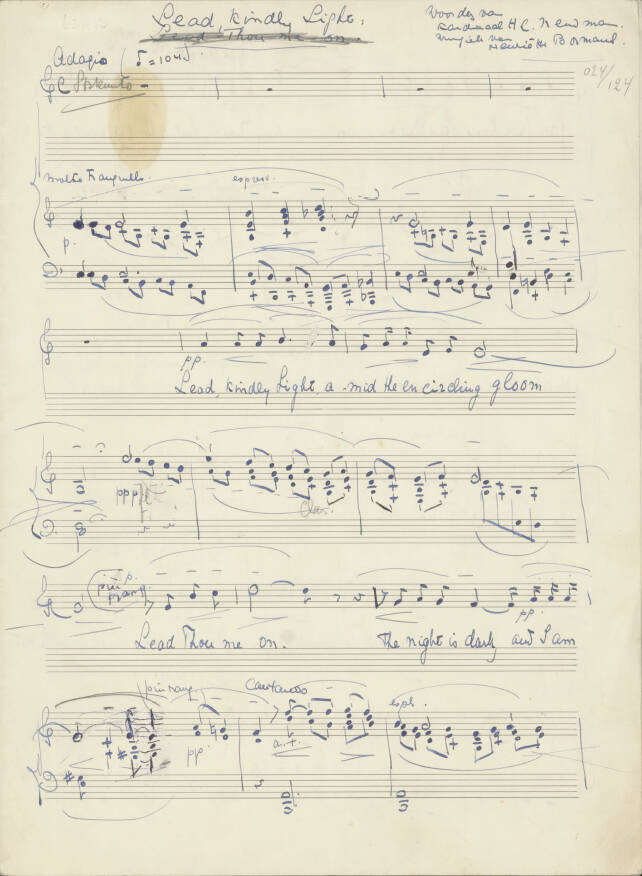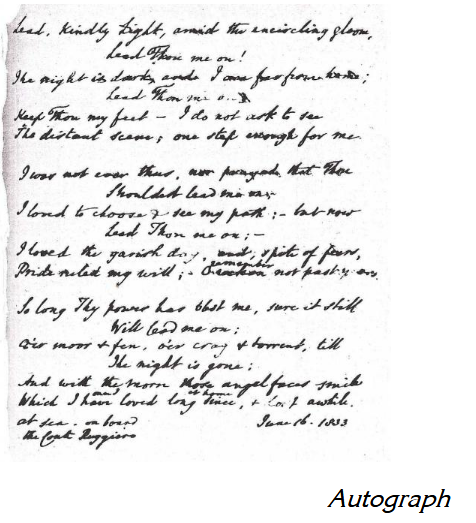Henriette Bosmans: Lead, Kindly Light for voice and piano or orchestra (1945)

Henriette Bosmans
born 6 December 1895 in Amsterdam
died 2 July 1952 in Amsterdam
Text:
John Henry Newman (1801–1890)
Dedication:
Jo Vincent
Premiere:
3 November 1945 by Jo Vincent, soprano, and the Concertgebouw Orchestra conducted by Adrian Boult
CD recordings:
1998 Julia Bronkhorst (soprano), Maarten Hillenius (piano)
2025 Rowan Pierce and BBC Philharmonic conducted by George Vass
When John Henry Newman, who later became a Catholic cardinal, fell ill as a young priest on a trip to Sicily in 1833 and had to wait impatiently for his journey home to England, he wrote his famous poem: Lead, Kindly Light. The poem became popular as an English hymn thanks to John Bacchus Dykes' 1868 setting to music. Newman: ‘Finally, I arrived in Marseille in an orange boat. At that time, I wrote the lines “Lead, kindly light”, which have since become very well known. We lay in the Strait of Bonifacio for a whole week in a calm. I wrote poems throughout the entire crossing’ (Newman).
The poem refers theologically to the account in the biblical book of Exodus 13:21-22: ‘Adonai went before them by day in a pillar of cloud to show them the way, and by night in a pillar of fire to give them light. So they could travel day and night. The pillar of cloud did not depart from the top of the people by day, nor the pillar of fire by night.’
As a half-Jew (her father was Catholic, her mother Jewish), Dutch composer Henriette Bosmans had to give up composing and performing during the Nazi occupation. She was only able to work as a pianist and artist in small circles and earn a living. In a courageous initiative and thanks to her contacts with conductor Willem Mengelberg, she managed to secure the release of her mother, who had already been arrested, and save her from deportation to a concentration camp.
After this dark and difficult period, Henriette Bosmans began composing again towards the end of the Second World War and, among other things, set John Henry Newman's poem ‘Lead, kindly Light’ to music as an art song. First for soprano and piano, later also for soprano and orchestra. The premiere took place after the end of the war on 3 November 1945, performed by Jo Vincent, soprano, and the Concertgebouw Orchestra conducted by Adrian Boult. The poem testifies to the belief in the ever-illuminating presence of mysterious transcendence (the ‘pillar of fire’ from Ex 13!)) both in the course of history and in personal life. Even in dark times, the believer should find hope and confidence in the next step.
Listen here! (approx. 5 1/2 min.)
Piano version
Orchestral version
Listening companion
The two downward phrases in the lower voice of the introduction and the hesitant break express uncertainty and loneliness.
In the third, brighter repetition, the singing voice enters with a simple melody. The first glimmer of hope for light and guidance becomes apparent in the subsequent upward movement when the soprano sings ‘Lead Thou me on’. After describing the darkness, this upward-moving plea is repeated passionately once more.
The request for guidance, however, is modest; one step is enough. The melody slopes downwards insightfully.
Once again, the downward phrase of the beginning starts and becomes a continuous accompaniment. Looking back at the past leads to an intensified request for light and guidance: Lead Thou me on!
The new motif for ‘Pride ruled my will’ recalls the self-sufficient pride that caused us to forget the protective presence of the light of the ‘pillar of fire’ (Ex 30) in recent years.
The supplication slowly transforms into a more appropriate prayer, namely into an attitude of gratitude and confidence for the ever-present accompaniment of life, as expressed in the music.
In this way, the person who was originally frightened and asking for help can once again turn to the present with confidence and joy: ‘The night is gone.’ The music can spread and becomes pure presence.
A new morning brings the now confident person a reunion with their loved ones, who become angels to them, representatives of God in the here and now.
The utopia: kind people become a guiding light for one another.
Lead, Kindly Light, amidst th'encircling gloom,
Lead Thou me on!
The night is dark, and I am far from home,
Lead Thou me on!
Keep Thou my feet; I do not ask to see
The distant scene; one step enough for me.
I was not ever thus,
nor prayed that Thou
Shouldst lead me on;
I loved to choose and see my path; but now
Lead Thou me on!
I loved the garish day, and, spite of fears,
Pride ruled my will.
Remember not past years!
So long Thy power hath blest me, sure it still
Will lead me on.
O'er moor and fen, o'er crag and torrent, till
The night is gone,
And with the morn those angel faces smile,
Which I have loved long since, and lost awhile!
Lead, Kindly Light,
Lead Thou me on!
Lead Thou me on!
Lead Thou me on!

Note for music lovers:
Website: Unknown Violin Concertos